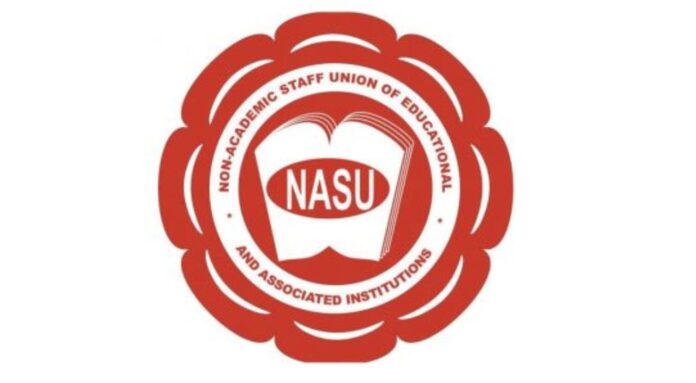The Non-Academic Staff Union of Educational and Associated Institutions (NASU) has raised a strong alarm over what it describes as a secret agreement between the Federal Government and the Academic Staff Union of Universities (ASUU) regarding the disbursement of N50 billion in earned allowances. NASU warned that if the government goes ahead with a biased allocation of the funds, it could spark another round of strikes that would disrupt Nigeria’s public university system.
Speaking at the Universities and Inter-University Centres Trade Group Council Meeting held in Abuja, NASU General Secretary, Prince Peters Adeyemi, expressed deep concerns over the government’s alleged one-sided treatment of university unions. He warned that any attempt to favour ASUU over the other three unions would not be tolerated.
The controversy centers around the Federal Government’s commitment in August 2022 to release N50 billion in earned allowances, meant to be shared among all staff unions in federal universities. According to Adeyemi, there is strong suspicion that the government is preparing to pay the entire amount to ASUU, excluding the non-teaching unions, including NASU.
“We strongly suspect the government intends to pay the N50 billion to just one union,” Adeyemi said. “If this happens, it will certainly lead to industrial unrest in our universities once again.”
Adeyemi noted that in the past, the distribution of earned allowances had been lopsided, with ASUU receiving up to 70 percent, while the remaining 30 percent was shared among the three non-teaching unions. This unfair treatment, he said, led to resentment and was one of the reasons for the prolonged strikes in 2022.
The union became alarmed when it learnt that a recent stakeholders’ meeting on the disbursement of the N50 billion was held with only ASUU in attendance. NASU views this move as a clear signal that the government may be planning to sideline other unions once again.
Adeyemi stressed that such actions breach the agreement signed by all unions in 2022 and would deepen divisions within the already fragile university system.
“We demand transparency and fairness in this matter. No union should be treated as superior to others,” he said.
Beyond the N50 billion earned allowance, NASU raised other longstanding concerns. One major issue is the malfunctioning of the Integrated Personnel and Payroll Information System (IPPIS). The system, which was introduced to streamline payroll management across federal institutions, has been a source of constant problems, especially for non-teaching staff.
Adeyemi explained that IPPIS has failed to fully integrate both assets and liabilities, leading to discrepancies in salaries and payments. He also condemned the illegal stoppage of check-off dues in some institutions, such as the Federal Polytechnic, Ekowe in Bayelsa State, warning that no university head has the right to stop dues protected under Nigeria’s labour laws.
NASU President, Dr. Hassan Makolo, also addressed the meeting, expressing frustration over the delayed renegotiation of the 2009 union agreement. Talks that began in 2024 have since stalled, with no significant progress.
“Enough is enough,” Dr. Makolo declared. “The government must act with sincerity and urgency. We cannot continue to work under these conditions while being treated unfairly.”
He added that the continued delay in addressing union demands and fulfilling signed agreements is pushing the education sector further into crisis.
The Lagos State Chairman of NASU, Timothy Olawore, described the state of Nigeria’s education sector as deeply troubling. He highlighted issues such as poor funding, bad infrastructure, and increasing brain drain, noting that these challenges are driving young professionals and academics out of the country in search of better opportunities.
Despite these challenges, he reiterated NASU’s commitment to fighting for the improvement of the sector and better welfare for its members.
Also speaking at the meeting, the Trade Group Council Chairman and NASU Deputy President, Buhari Suleiman, warned about the general decline of Nigeria’s development due to failures in key sectors. He criticised the 9.2 percent budget allocation to education in the 2025 budget, calling it a “clear disregard for global standards” that recommend a minimum of 15 to 20 percent.
Suleiman further condemned Nigeria’s poor ranking in the Global Terrorism Index, the worsening power supply crisis, and the rising youth unemployment rate. He stressed that no country can grow if its youth are neglected and called on national leaders to initiate bold reforms.
“No nation develops when its future—the youth—is abandoned,” he said. “We need urgent reforms in leadership, education, and infrastructure to get Nigeria back on track.”
NASU has now issued a clear warning to the Federal Government: unless the N50 billion earned allowance is distributed fairly, and all pending union issues are addressed—especially those concerning IPPIS, unpaid arrears, and the stalled agreement—the union will not hesitate to embark on a nationwide strike.
The union has urged the government to avoid another crisis in the education sector by acting quickly, fairly, and transparently.
Earned allowances in Nigerian universities refer to additional payments due to staff based on extra duties performed. These include supervision of postgraduate theses, teaching overload, and administrative responsibilities, among others. The issue of how these allowances are shared between academic and non-academic staff has been a major source of conflict for years.
In August 2022, after a series of negotiations following one of the longest strikes in Nigeria’s university history, the government agreed to pay N50 billion in earned allowances. However, implementation has been repeatedly delayed, and the recent report of a possible exclusive deal with ASUU has reignited tensions.
The Federal Ministry of Education has not yet issued an official response to the fresh accusations by NASU. But many stakeholders are calling for urgent action to prevent further disruptions in the already struggling university system.

